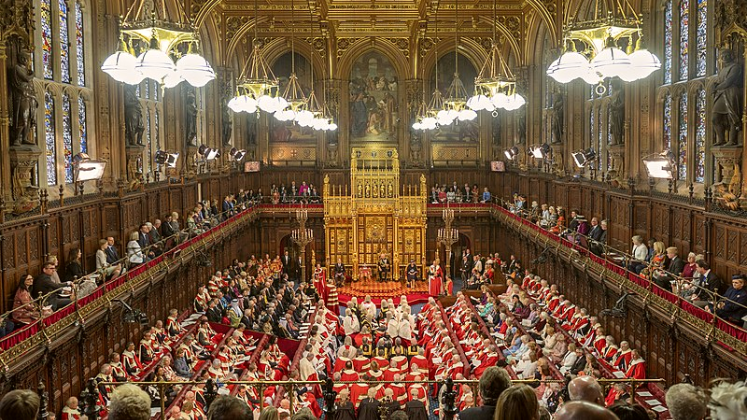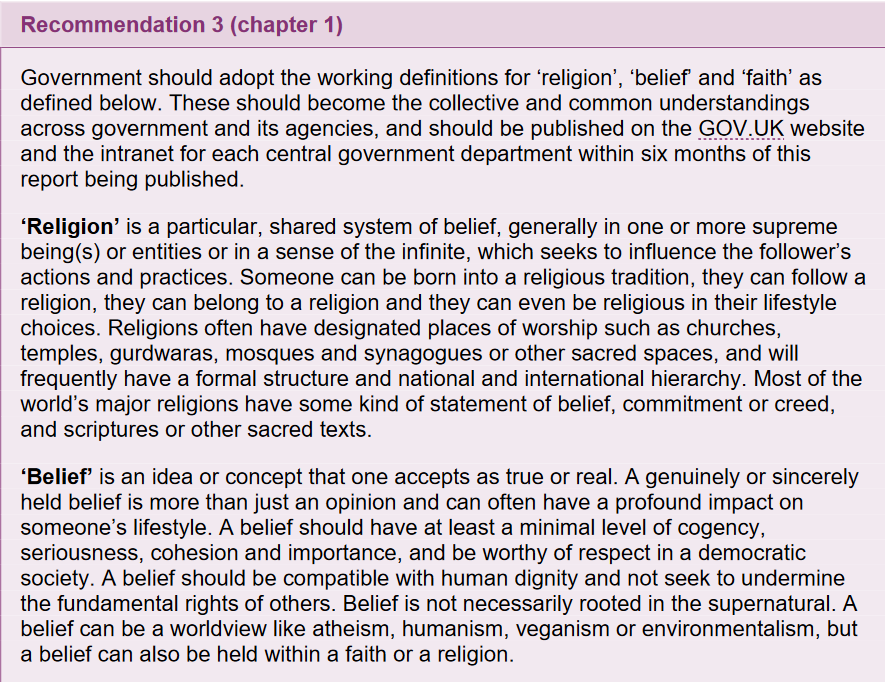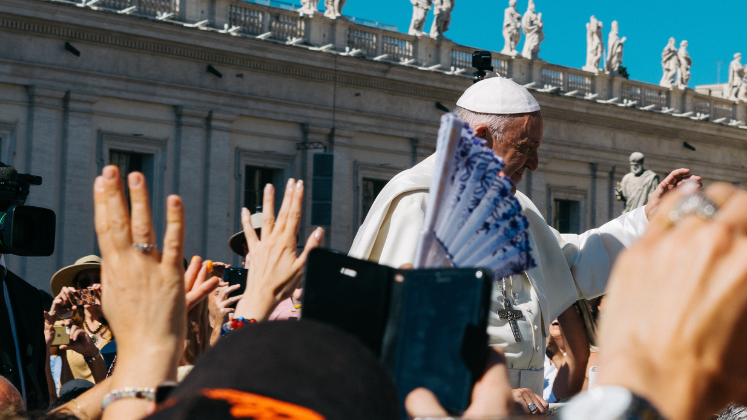The recently published Bloom Report is a landmark review into faith engagement and strongly encourages the government to recognise faith groups as a force for good. But what does “good” religion mean? Here, Dr David Robertson looks at how the report measures this.

In October 2019, the then-Prime Minister Boris Johnson appointed an Independent Faith Engagement Adviser to make recommendations to the Secretary of State for Communities. The final report, “Does Government ‘do God’? An Independent review into how Government engages with Faith” (also known as the Bloom Report), was published on 26th April, 2023. It clocks in at 159 pages, including a series of twenty-two recommendations on “properly engaging with people of faith” (summarised on pp. 18-24).
There is much to commend in the report’s conclusions. #7 urges government to properly support RE teaching in secondary schools. It also seeks to redress the way that Muslims were singled out for criticism in the Blair/post 9-11 era, with policies such as the Prevent Strategy seemingly assuming the Muslim was the image of “problematic” religion (#14). It also acknowledges the diversity within religious communities—a theme which our students on A332 Why is Religion Controversial? are very familiar with. Perhaps most significantly, it urges the government not to shy away from addressing problems within religious communities “head on”. Forced marriage is an issue that Bloom particularly focuses on (#20-22), but the report also discusses financial exploitation, radicalisation in prisons (#11) and coercive control (#19), but not clerical abuse, nor the role of religious institutions in challenging anti-LGBTQ+ equality.
The report also recognises the growing religious diversity in the UK, but however fails to acknowledge the most seismic change to the religious landscape in the UK today—the rise of “no religion”, a cohort which has grown 26% since 2001, drawing in the main from those who formerly identified as Christian. The UK is no longer a Christian-majority country, indeed it is likely a country which will soon be a majority non-religious country, but you would not get that impression from this report (see the critical response from Humanists UK).
To be fair, Bloom does see the non-religious as “part of the solution to improving society” (p.5). In fact, he proposes that the government should divide religious people into three groups: “true believers”, “non-believers” and “make believers” (let’s ignore for the moment the awkward categorisation of “non-believers” as a category of “believers”).
The first are ‘true believers’ who, regardless of their faith, are sincere, devout and peaceful. Government can and should work with true believers. The second are ‘non-believers’ who, like true believers, are generally sincere, peaceful and decent. True believers and non-believers are part of the solution to improving society. The third are ‘make-believers’. Make-believers are generally the cause of most of the problems that government encounters in the faith space. Make-believers are often motivated by ego, money, prestige or power and abuse their position to promote themselves or their causes, clothing them with religion to give them divine legitimacy. Make-believers are a problem, both for government and for the communities they claim to represent.
It is commendable that here Bloom puts “true believers” and “non-believers” on the same footing as being sincere and peaceful (until you notice the qualifier “generally”, at least). But this categorisation is highly problematic, nevertheless. Bloom is here combining two inaccurate, though widespread, tropes—on the one hand, that religion is necessarily about “sincere belief”, and on the other, that religion is always a force for good.
The first trope is clear in the definitions of “religion”, “belief” and “faith” which the report presents in Recommendation #3.
Each of these definitions comes back to the idea that “religion = belief”. Religion is defined as “a shared system of belief”, and “faith” is a particular kind of belief which Bloom sees as typifying religion. This equation is implicit every time the word “faith” is used to mean simply “religion”, as the Bloom report does. This is a Protestant view of what religion is (or should be) and does not accurately represent other traditions in which one’s actions (such as attending festivals or giving offerings) or group identity are paramount. But despite being a Christian theological principle (and one that fits Protestantism better, to boot), this is actually inscribed in law—“sincere belief” is a requirement for something to be protected under human rights legislation in the UK, and around the world.
More problematic is how many normative statements and undefined terms these definitions contain. How can we know or judge how “sincerely held” someone’s belief is? How are we to objectively measure its “cogency” or “importance”, if it is “profound” or “worthy of respect” a priori? How does one establish the “human dignity” against which it is to be measured? What makes a conviction “spiritual” or principles “divine”? What are these “fundamental rights”, and upon what basis are they established?
Most interestingly, Bloom states that faith “goes beyond empirical experience” and “logical proof”—not that it lacks empirical proof, which is the standard everywhere else, but “goes beyond”. Bloom is therefore granting credence to super-empirical claims—a curious move for a government that claims to “follow the science”. If we are to accept some claims without evidence, how would we know which ones to reject? Wouldn’t all of Bloom’s definitions also apply to, say, QAnon conspiracy theories? It’s a particular, shared system of belief, sincerely held and influencing practices, and goes beyond empirical proof. I expect that the response would be that it is not cogent, serious, or worthy of respect—but those are arbitrary value judgements, not empirical facts, which shows that these definitions are ultimately no more than a simple “I know it when I see it”.
In the UK, the decision as to whether a worldview is to be considered “religion” or not is made by the charity commission. To be recognised as a religious charity, it must convince the commission that it will act in the public good. This brings us to Bloom’s second trope—that religion that religion must be a positive force. For Bloom, the really religious (i.e., those who “sincerely” believe) are always good, and the problems are caused by those who don’t really believe. It is hard to accept the conclusion that those fighting in wars of religion, from the Crusades to the Thirty Years War to Israel and Northern Ireland today, don’t really believe. But Bloom writes about make-believers “clothing them[selves] with religion”, and other times people will talk about “misusing” or “abusing” religion. As well as assuming that religion is a distinct thing that is separate from politics, identity, economics, etc., (something which scholars and religious representatives have equally questioned), it assumes that religion is necessarily “good”. For Bloom, if it’s not “good”, it’s not real religion.
Note: This piece gives the views of the author, and not the position of the LSE Religion and Global Society blog, nor of the London School of Economics.






